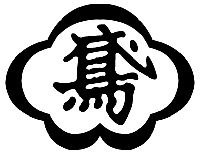The daimon of Sakaume-gumi  | |
| Founder | Umekichi Tobi |
|---|---|
| Founding location | Osaka, Japan |
| Membership | 30 |
| Leader(s) | Masahide Kinoshita |
The Sakaume-gumi (酒梅組) is a yakuza organization based in Osaka, Japan.[1] The Sakaume-gumi is a designated yakuza group with an estimated 30 active members.[2]
The Sakaume-gumi is an old-established, small group that focuses primarily on gambling, and not on other activities like extortion and drugs. Perhaps because of this, it has had relatively good relations with the local police.
When Japan passed new anti-boryokudan laws in 1992, the Sakaume-gumi was one of the few Kansai-based groups not to launch legal challenges against the new legislation. At a hearing, the group's representative stated, "If the Sakaume-gumi fulfills conditions for designation (as a boryokudan group), we have no choice but to accept it."
History
The Sakaume-gumi was registered as a designated yakuza group under the Organized Crime Countermeasures Law in May 1993.[3]
Condition
The Sakaume-gumi is one of the two designated yakuza groups based in the Osaka Prefecture, along with the Azuma-gumi, and maintains its headquarters office in Nishinari, Osaka.[4]
One former member of the Sakaume-gumi has achieved a measure of fame in another field: born-again Christianity. Rev Hiroyuki Suzuki, a tattooed, pinky-missing former Sakaume-gumi gangster, has become an evangelical Christian preacher.[5]
Presidents
- 1st: Umekichi Tobi
- 2nd: Yukichi Tanaka
- 3rd: Shojiro Matsuyama
- 4th: Yukio Nakano
- 5th: Masao Taniguchi
- 6th: Koji Oyama (Korean name: Sin Kyoung-youl)
- 7th: Kozaburo Kanayama (Korean name: Kim Jae-hak)
- 8th: Yoshimasa Minami (Korean name: Nam Yoil)
- 9th: Mitsuo Yoshimura
- 10th: Masahide Kinoshita
References
- ^ "Police of Japan 2011, Criminal Investigation : 2. Fight Against Organized Crime", December 2009, National Police Agency
- ^ National Police Agency(in Japanese) (2020-04-02). 令和元年における組織犯罪の情勢【確定値版 (PDF) (Report). pp. 7–40. Retrieved 2020-04-29.
- ^ "List of designated boryokudan groups under the Organized Crime Countermeasures Law", 2 August 2011, The Kochi Prefectural Center for the Elimination of Violence (in Japanese)
- ^ "2010 Police White Paper Chapter 2 : Furtherance of Organized Crime Countermeasures", 2010, National Police Agency (in Japanese)
- ^ "He Watched Over His Rackets; Now It's His Flock", 22 June 1999, The New York Times